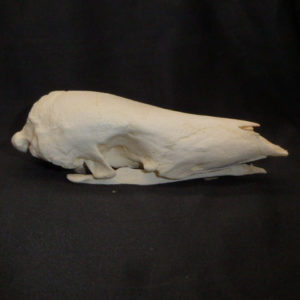S. gigantea Skull Replica measures 6.5 inches. S. gigantea Skull Replica is museum quality polyurethane cast. Made in USA. 2-part skull (separate cranium and jaw). Known as the Giant Malayan Pangolin.
S. gigantea have large, protective keratin scales covering their skin; they are the only known mammals with this feature. They live in hollow trees or burrows, depending on the species.
Giant Malayan Pangolins or S. gigantea are nocturnal, and their diet consists of mainly ants and termites, which they capture using their long tongues.
They tend to be solitary animals, meeting only to mate and produce a litter of one to three offspring, which are raised for about two years.
The animal has a strong sense of smell and large anal glands. Its secretions may be significant to animal communication.
The species walks with most of its weight on its columnar rear legs, and curls its front paws, walking on the outside of the wrists rather than the palms to protect the claws.
Unlike its close relative, the ground pangolin, this pangolin does not walk upright as a biped.
As in all pangolins, infants have soft scales that eventually harden, and are born with open eyes. They cannot walk on their legs, but can move on their bellies.
During age 6–8 weeks, the young often spew a yellow secretion from their anal glands (that is often said to smell of decay and cabbage) to keep predators and other animals from taking advantage of their mothers.
They are threatened by poaching (for their meat and scales) and heavy deforestation of their natural habitats, and are the most trafficked mammals in the world.
Of the eight species of pangolin, four (Phataginus tetradactyla, P. tricuspis, Smutsia gigantea, and S. temminckii) are listed as vulnerable.
The giant pangolin is threatened by habitat destruction and deforestation, and hunting for the bushmeat trade.
Between 2011 and 2015, nine shipments with pangolin body parts were seized in Asia that originated in Nigeria. They contained 3,000 kg (6,600 lb) pangolin meat and close to 5,500 kg (12,100 lb) pangolin scales that were destined to China and Laos.


